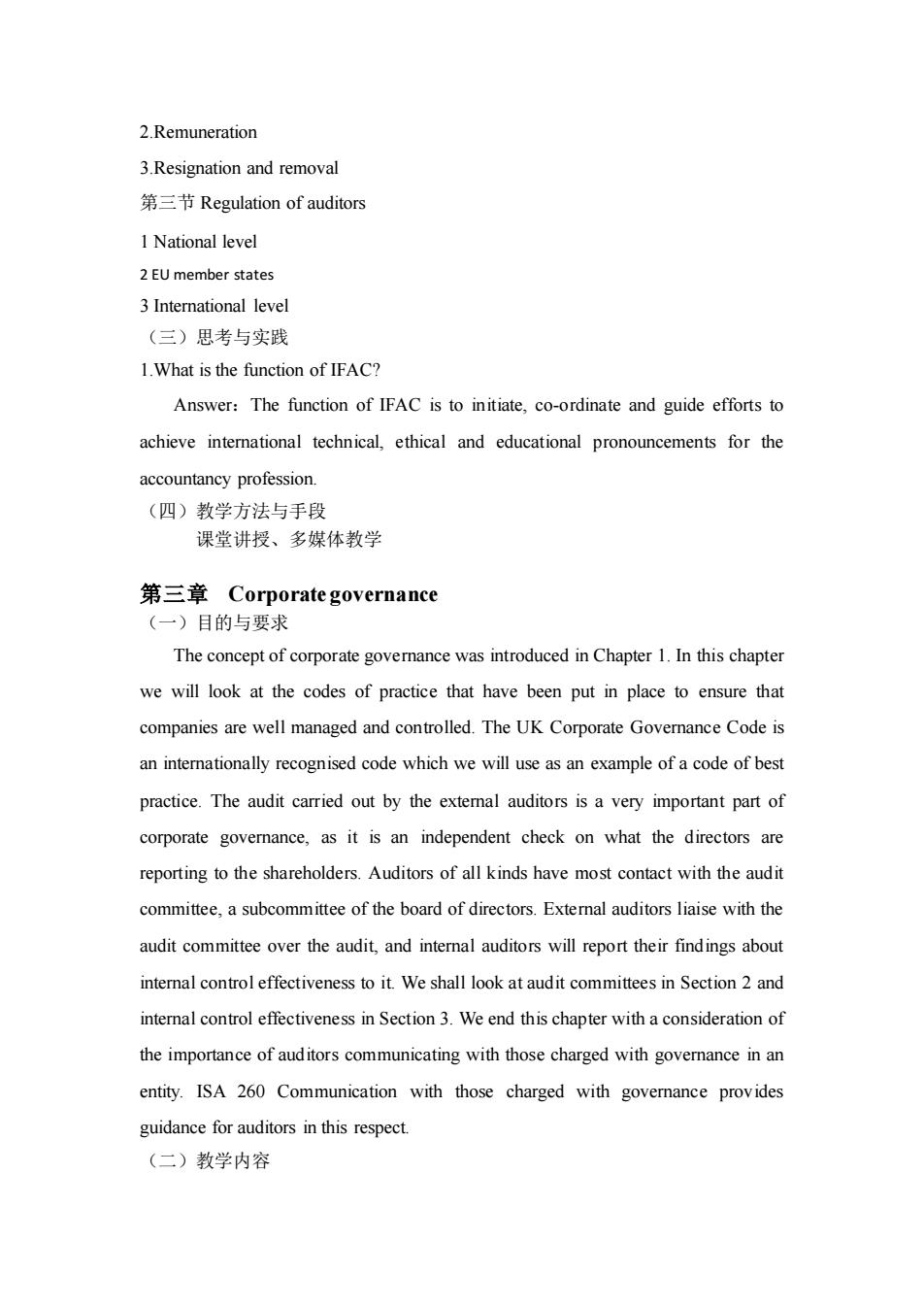
2.Remuneration 3.Resignation and removal 第三节Regulation of auditors 1National level 2EUmember states 3International level (三)思考与实践 1.What is the function of IFAC? Answer:The function of IFAC is to initiate,co-ordinate and guide efforts to achieve international technical,ethical and educational pronouncements for the accountancy profession. (四)教学方法与手段 课堂讲授、多煤体教学 第三章Corporate governance (一)目的与要求 The concept of corporate govemance was introduced in Chapter 1.In this chapter we will look at the codes of practice that have been put in place to ensure that companies are well managed and controlled.The UK Corporate Govemance Code is an internationally recognised code which we will use as an example of a code of best practice.The audit carried out by the extemal auditors is a very important part of corporate govemance,as it is an independent check on what the directors are reporting to the shareholders.Auditors of all kinds have most contact with the audit committee,a subcommittee of the board of directors.Extemal auditors liaise with the audit committee over the audit,and interal auditors will report their findings about interal control effectiveness to it We shall look at audit committees in Section 2 and intemal control effectiveness in Section 3.We end this chapter with a consideration of the importance of auditors communicating with those charged with governance in an entity.ISA 260 Communication with those charged with governance provides guidance for auditors in this respect (二)教学内容
2.Remuneration 3.Resignation and removal 第三节 Regulation of auditors 1 National level 2 EU member states 3 International level (三)思考与实践 1.What is the function of IFAC? Answer:The function of IFAC is to initiate, co-ordinate and guide efforts to achieve international technical, ethical and educational pronouncements for the accountancy profession. (四)教学方法与手段 课堂讲授、多媒体教学 第三章 Corporate governance (一)目的与要求 The concept of corporate governance was introduced in Chapter 1. In this chapter we will look at the codes of practice that have been put in place to ensure that companies are well managed and controlled. The UK Corporate Governance Code is an internationally recognised code which we will use as an example of a code of best practice. The audit carried out by the external auditors is a very important part of corporate governance, as it is an independent check on what the directors are reporting to the shareholders. Auditors of all kinds have most contact with the audit committee, a subcommittee of the board of directors. External auditors liaise with the audit committee over the audit, and internal auditors will report their findings about internal control effectiveness to it. We shall look at audit committees in Section 2 and internal control effectiveness in Section 3. We end this chapter with a consideration of the importance of auditors communicating with those charged with governance in an entity. ISA 260 Communication with those charged with governance provides guidance for auditors in this respect. (二)教学内容
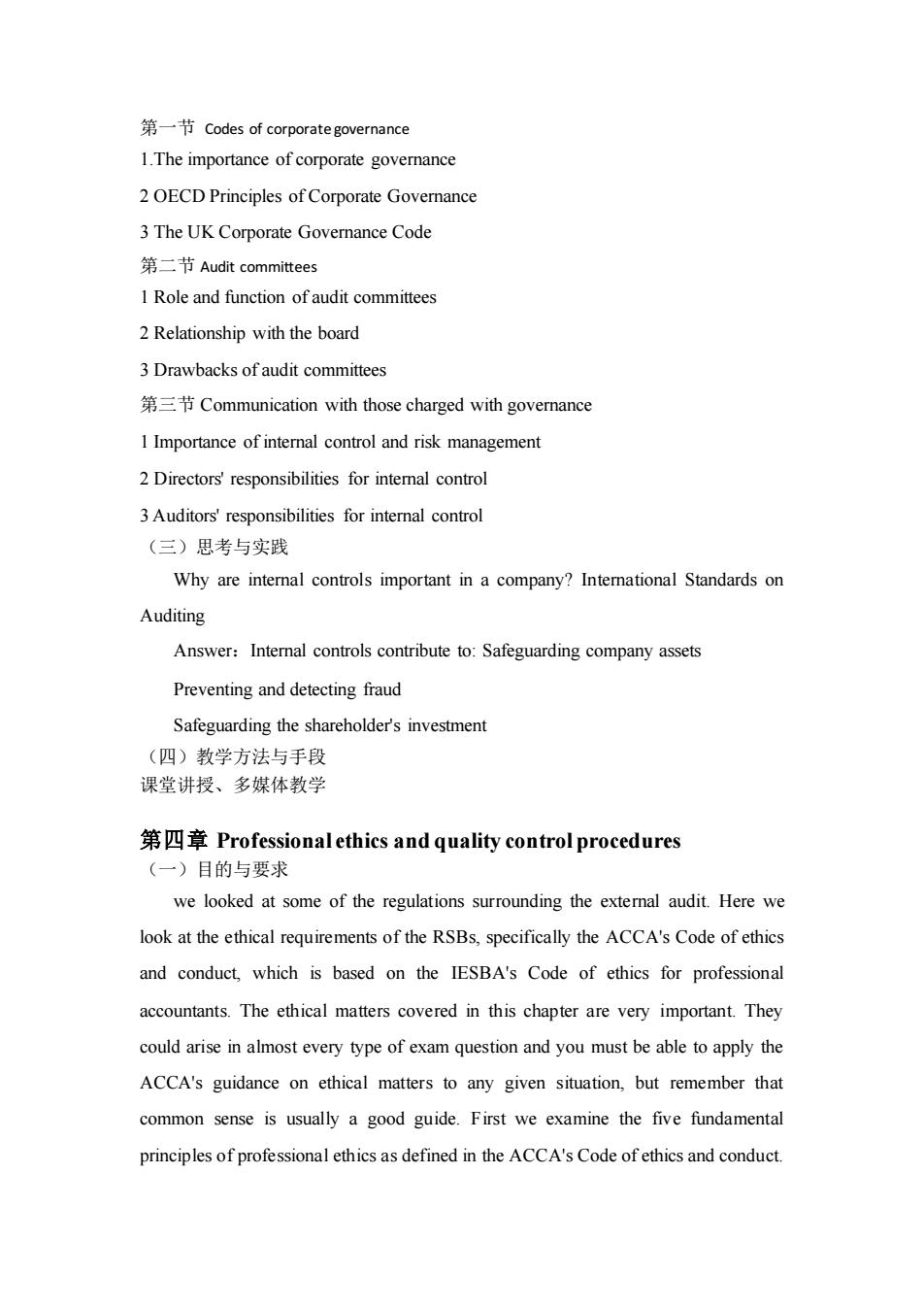
第一节Codes of corporate governance 1.The importance of corporate governance 2 OECD Principles of Corporate Governance 3The UK Corporate Governance Code 第二节Audit committees 1 Role and function ofaudit committees 2 Relationship with the board 3 Drawbacks of audit committees 第三节Communication with those charged with governance 1 Importance of intemal control and risk management 2 Directors responsibilities for intemal control 3Auditors'responsibilities for interal contro (三)思考与实践 Why are intemal controls important in a company?Intemational Standards on Auditing Answer:Intemal controls contribute to:Safeguarding company assets Preventing and detecting fraud Safeguarding the shareholder's investment (四)教学方法与手段 课堂讲授、多媒体教学 第四章Professional ethics and quality control procedures (一)目的与要求 we looked at some of the regulations surrounding the extemal audit.Here we look at the ethical requirements of the RSBs,specifically the ACCA's Code of ethics and conduct,which is based on the IESBA's Code of ethics for professional accountants.The ethical matters covered in this chapter are very important.They could arise in almost every type of exam question and you must be able to apply the ACCA's guidance on ethical matters to any given situation,but remember that common sense is usually a good guide.First we examine the five fundamental principles of professional ethics as defined in the ACCA's Code of ethics and conduct
第一节 Codes of corporate governance 1.The importance of corporate governance 2 OECD Principles of Corporate Governance 3 The UK Corporate Governance Code 第二节 Audit committees 1 Role and function of audit committees 2 Relationship with the board 3 Drawbacks of audit committees 第三节 Communication with those charged with governance 1 Importance of internal control and risk management 2 Directors' responsibilities for internal control 3 Auditors' responsibilities for internal control (三)思考与实践 Why are internal controls important in a company? International Standards on Auditing Answer:Internal controls contribute to: Safeguarding company assets Preventing and detecting fraud Safeguarding the shareholder's investment (四)教学方法与手段 课堂讲授、多媒体教学 第四章 Professional ethics and quality control procedures (一)目的与要求 we looked at some of the regulations surrounding the external audit. Here we look at the ethical requirements of the RSBs, specifically the ACCA's Code of ethics and conduct, which is based on the IESBA's Code of ethics for professional accountants. The ethical matters covered in this chapter are very important. They could arise in almost every type of exam question and you must be able to apply the ACCA's guidance on ethical matters to any given situation, but remember that common sense is usually a good guide. First we examine the five fundamental principles of professional ethics as defined in the ACCA's Code of ethics and conduct
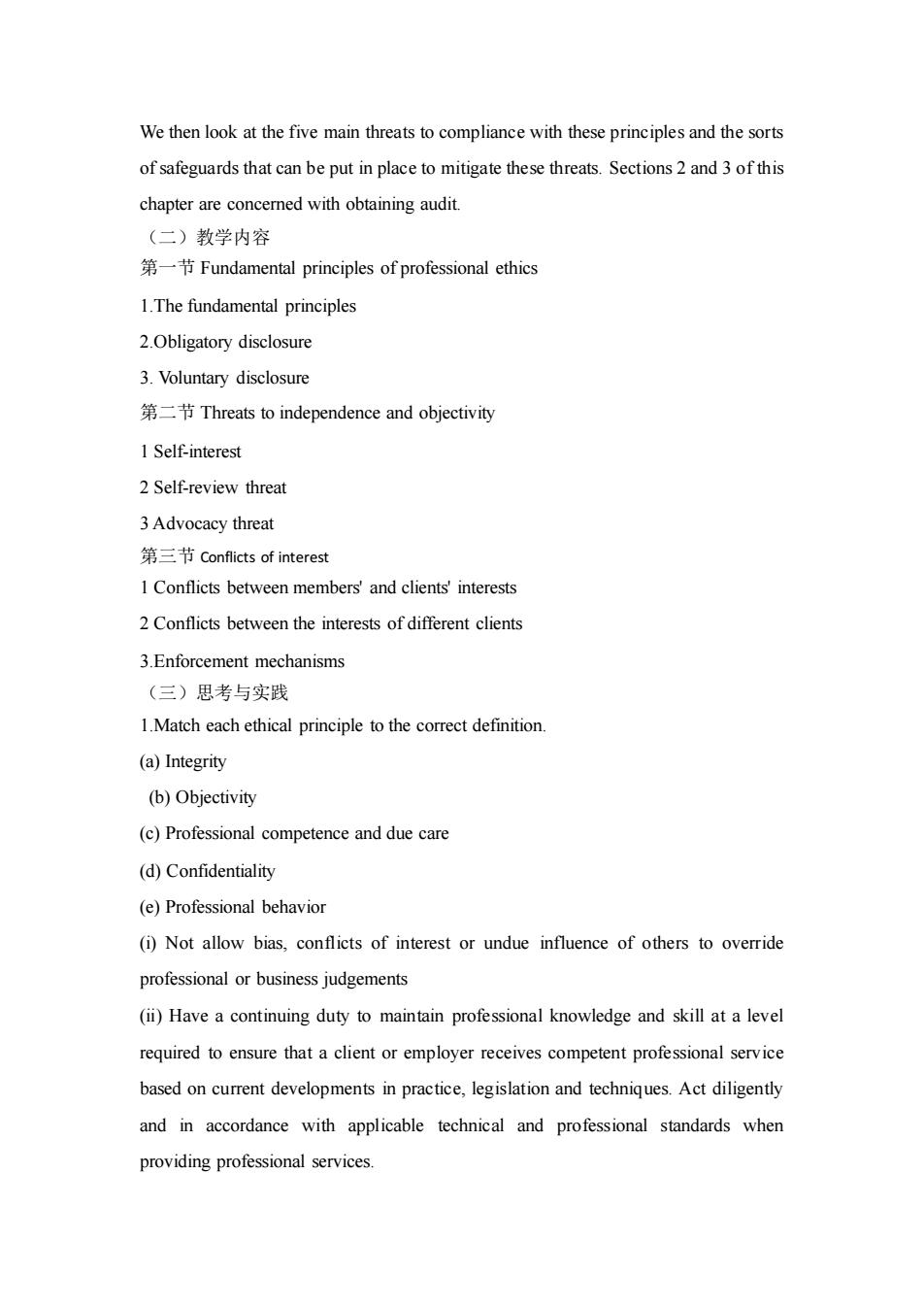
We then look at the five main threats to compliance with these principles and the sorts of safeguards that can be put in place to mitigate these threats.Sections 2 and 3 of this chapter are concerned with obtaining audit. (二)教学内容 Fundamental principles of professional ethics 1.The fundamental principles 2.Obligatory disclosure 3.Voluntary disclosure 第二节Threats to independence and objectivity Self-interest 2 Self-review threat 3 Advocacy threat 第三节Conflicts of interest 1 Conflicts between members'and clients'interests 2 Conflicts between the interests of different clients 3.Enforcement mechanisms (三)思考与实践 1.Match each ethical principle to the correct definition. (a)Integrity (b)Objectivity (c)Professional competence and due care (d)Confidentiality (e)Professional behavior (i)Not allow bias,conflicts of interest or undue influence of others to override professional or business judgements (ii)Have a continuing duty to maintain professional knowledge and skill at a level required to ensure that a client or employer receives competent professional service based on current developments in practice,legislation and techniques.Act diligently and in accordance with applicable technical and professional standards when providing professional services
We then look at the five main threats to compliance with these principles and the sorts of safeguards that can be put in place to mitigate these threats. Sections 2 and 3 of this chapter are concerned with obtaining audit. (二)教学内容 第一节 Fundamental principles of professional ethics 1.The fundamental principles 2.Obligatory disclosure 3. Voluntary disclosure 第二节 Threats to independence and objectivity 1 Self-interest 2 Self-review threat 3 Advocacy threat 第三节 Conflicts of interest 1 Conflicts between members' and clients' interests 2 Conflicts between the interests of different clients 3.Enforcement mechanisms (三)思考与实践 1.Match each ethical principle to the correct definition. (a) Integrity (b) Objectivity (c) Professional competence and due care (d) Confidentiality (e) Professional behavior (i) Not allow bias, conflicts of interest or undue influence of others to override professional or business judgements (ii) Have a continuing duty to maintain professional knowledge and skill at a level required to ensure that a client or employer receives competent professional service based on current developments in practice, legislation and techniques. Act diligently and in accordance with applicable technical and professional standards when providing professional services
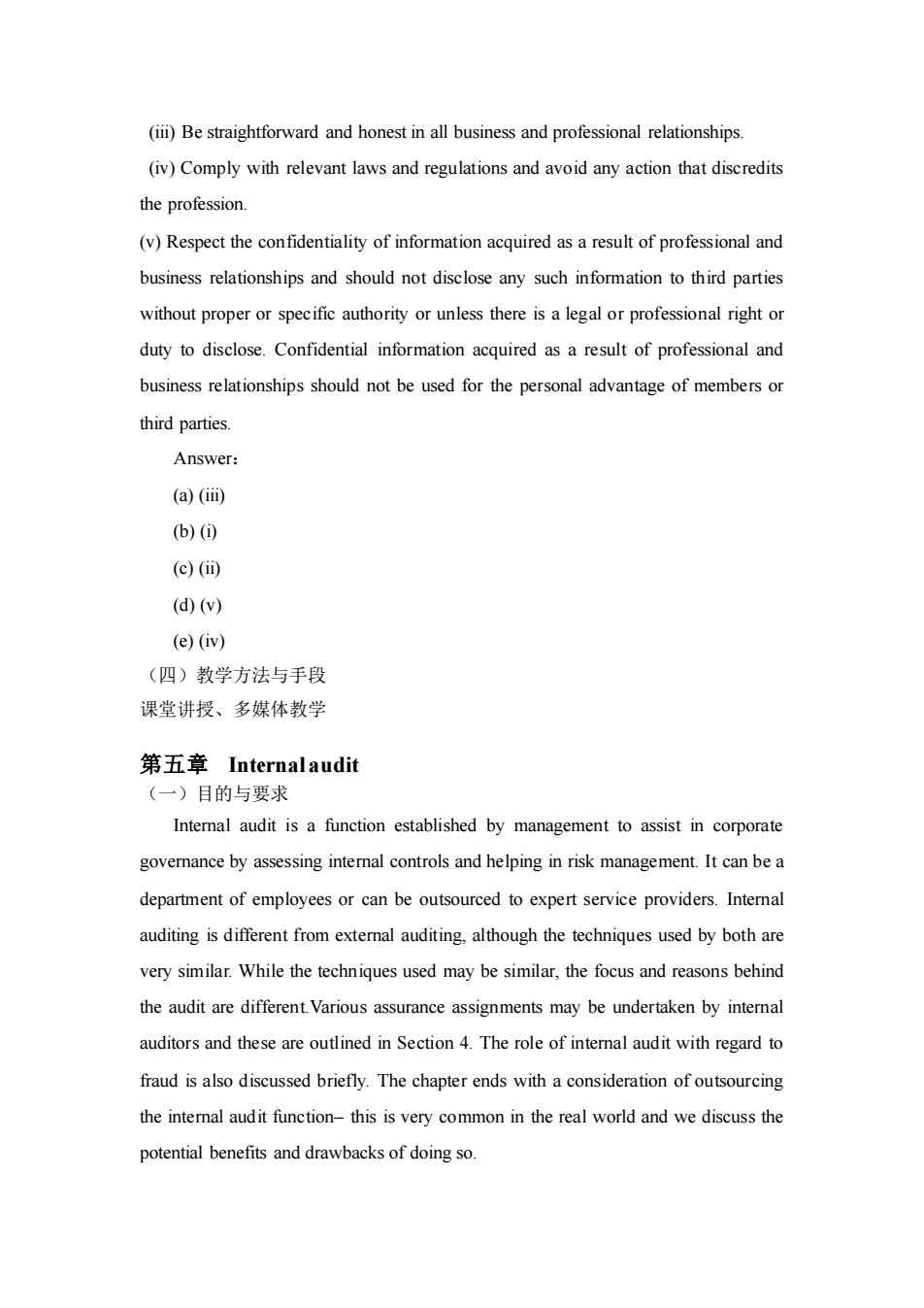
(iii)Be straightforward and honest in all business and professional relationships. (iv)Comply with relevant laws and regulations and avoid any action that discredits the profession (v)Respect the confidentiality of information acquired as a result of professional and business relationships and should not disclose any such information to third parties without proper or specific authority or unless there is a legal or professional right or duty to disclose.Confidential information acquired as a result of professional and business relationships should not be used for the personal advantage of members or third parties Answer: (a)(m (b)( (©(间 (d)(w) (e)(iv) (四)教学方法与手段 课堂讲授、多媒体教学 第五章Internalaudit (一)目的与要求 Intemal audit is a function established by management to assist in corporate goverance by assessing interal controls and helping in risk management.It can be a department of employees or can be outsourced to expert service providers.Interal auditing is different from extemal auditing.although the techniques used by both are very similar.While the techniques used may be similar,the focus and reasons behind the audit are different Various assurance assignments may be undertaken by intemnal auditors and these are outlined in Section 4.The role of internal audit with regard to fraud is also discussed briefly.The chapter ends with a consideration of outsourcing the intemal audit function-this is very common in the real world and we discuss the potential benefits and drawbacks of doing so
(iii) Be straightforward and honest in all business and professional relationships. (iv) Comply with relevant laws and regulations and avoid any action that discredits the profession. (v) Respect the confidentiality of information acquired as a result of professional and business relationships and should not disclose any such information to third parties without proper or specific authority or unless there is a legal or professional right or duty to disclose. Confidential information acquired as a result of professional and business relationships should not be used for the personal advantage of members or third parties. Answer: (a) (iii) (b) (i) (c) (ii) (d) (v) (e) (iv) (四)教学方法与手段 课堂讲授、多媒体教学 第五章 Internal audit (一)目的与要求 Internal audit is a function established by management to assist in corporate governance by assessing internal controls and helping in risk management. It can be a department of employees or can be outsourced to expert service providers. Internal auditing is different from external auditing, although the techniques used by both are very similar. While the techniques used may be similar, the focus and reasons behind the audit are different.Various assurance assignments may be undertaken by internal auditors and these are outlined in Section 4. The role of internal audit with regard to fraud is also discussed briefly. The chapter ends with a consideration of outsourcing the internal audit function– this is very common in the real world and we discuss the potential benefits and drawbacks of doing so
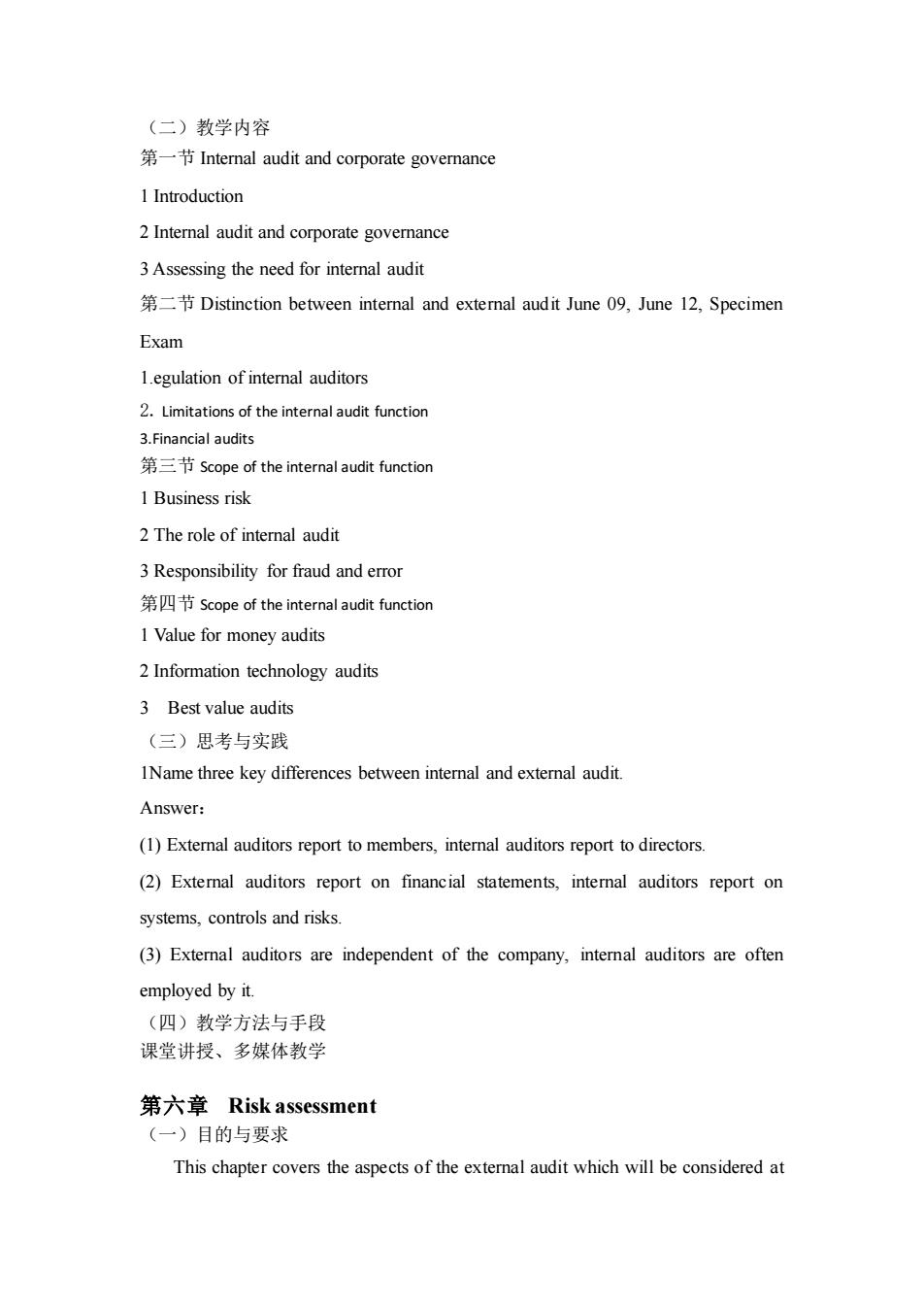
(二)教学内容 第-节Intemnal audit and corporate govemance I Introduction 2 Internal audit and corporate governance 3Assessing the need for interal audit Distinction between intemal and extemal audit June 09,June 12,Specimen Exam 1.egulation of internal auditors 2.Limitations of the internal audit function 3.Financial audits 第三节Scope of the internal audit function 1 Business risk 2 The role of internal audit 3 Responsibility for fraud and error 第四节Scope of the internal audit function 1 Value for money audits 2 Information technology audits 3 Best value audits (三)思考与实践 IName three key differences between interal and external audit Answer: (1)External auditors report to members,internal auditors report to directors. (2)Extemal auditors report on financial statements,interal auditors report on systems,controls and risks (3)External auditors are independent of the company,intemal auditors are often employed by it. (四)教学方法与手段 课堂讲授、多媒体教学 第六章Risk assessment (一)目的与要求 This chapter covers the aspects of the external audit which will be considered at
(二)教学内容 第一节 Internal audit and corporate governance 1 Introduction 2 Internal audit and corporate governance 3 Assessing the need for internal audit 第二节 Distinction between internal and external audit June 09, June 12, Specimen Exam 1.egulation of internal auditors 2. Limitations of the internal audit function 3.Financial audits 第三节 Scope of the internal audit function 1 Business risk 2 The role of internal audit 3 Responsibility for fraud and error 第四节 Scope of the internal audit function 1 Value for money audits 2 Information technology audits 3 Best value audits (三)思考与实践 1Name three key differences between internal and external audit. Answer: (1) External auditors report to members, internal auditors report to directors. (2) External auditors report on financial statements, internal auditors report on systems, controls and risks. (3) External auditors are independent of the company, internal auditors are often employed by it. (四)教学方法与手段 课堂讲授、多媒体教学 第六章 Risk assessment (一)目的与要求 This chapter covers the aspects of the external audit which will be considered at